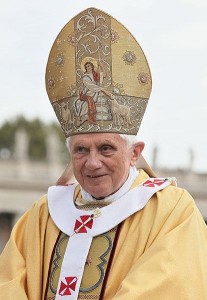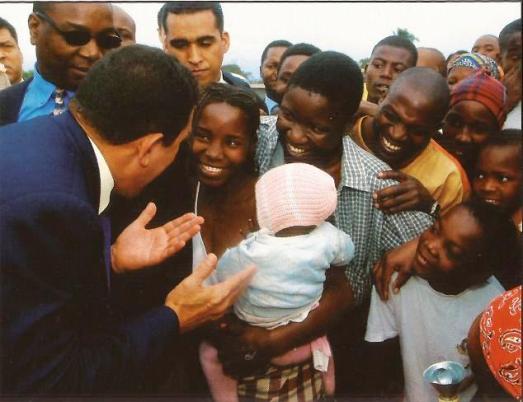The Catholic Church’s Lost Hope
http://consortiumnews.com/2013/03/03/the-catholic-churchs-lost-hope/
March 6, 2013
A half century ago, the Catholic Church had a chance for reform in the Second Vatican Council, with a young advocate in Joseph Ratzinger. But reactionary popes shunted reform aside, with Ratzinger later joining them as Pope Benedict XVI. That lost hope has put the Church in today’s crisis, says the Rev. Paul Surlis.
By the Rev. Paul Surlis
A Church with a “disfigured” face. That is Pope Benedict XVI’s description of how the Catholic Church sometimes is seen because “of sins against the unity of the church.” He said this in his last public Mass, but he offered no reflections on the role he himself played in this disfigurement, especially by his consistent refusal since around 1968 to embrace the structural changes and progressive teachings endorsed for the Church by the Second Vatican Council (1962-65).
Benedict, as Joseph Ratzinger, an expert at the council, explained and enthusiastically endorsed the reforming trends of the council. After each of the council’s four sessions, Dr. Ratzinger wrote a pamphlet-length account of what had transpired during the preceding session and these reflections were subsequently collected in a book,Theological Highlights of Vatican II.
Long out of print the book was republished fairly recently by Paulist Press and it provides us with an excellent guide to the council’s teachings from which unfortunately Dr. Ratzinger has retreated. He conveniently ignored the fact that an ecumenical council canonically exercises “supreme power over the entire church,” as he himself expressed it.
One of the great structural changes envisaged by the council was a transition from a centralized, monarchical papacy where one person, the pope, assisted by the curial cardinals, has absolute power over the universal church to a church that would be governed by the bishops of the entire church in union with the pope. As the twelve apostles were with and under Peter, so the bishops should be with and under the pope. And, according to the council’s vision, the wisdom of the People of God, i.e. rank-and-file members of the Church, should always be consulted.As part of collegiality it was intended that a synod representing the bishops of the universal church would be permanently in session and involved in church governance and would control the Curia, which would be forced to serve the pope and bishops as a civil service. However, the Curia reasserted itself after the council and now plays a dominant role in the universal Church.
A Failure at Reform
Vatican II’s deep structural changes have yet to be implemented, witness recent reports of corruption in the Curia. Fortunately, what these changes should entail is laid down in the section on collegiality in the Constitution on the Church (#22), in the formulation of which Dr. Ratzinger played a notable role.
A truly collegial church might well have avoided scandals and episcopal malfeasance in transferring priests guilty of sexual abuse, especially of minors, to conceal the wrongdoing, but unfortunately implementing collegiality and an independent synod of bishops is still a dead letter.
Pope John Paul II (1978-2005) made it clear at the outset of his papacy that the role of the bishops was to assist him in his ministry, not to exercise any sort of independent governance with and under him as the council envisaged. Coincidentally, the emphasis on reasserting absolute obedience to Paul VI’s condemnation of the use of contraceptives was as much about vindicating papal power as it was about the actual use of contraceptives.
Some national conferences of bishops reacted to dissension from Pope Paul’s teaching by stressing that decision-making about contraceptives was a matter of conscience for married couples, not simply one of unquestioning obedience. Even a controlling pope like John Paul II could not cause lay people to veer from a course on which more and more of them had begun to embark in the early 1960s. Still it appears that he deeply resented those episcopal conferences which endorsed the right in conscience to disagree with papal teaching.
And so, he too ignored in practice the council’s teaching on collegiality. He also curtailed the teaching role of national conferences of bishops because he disagreed with their consulting lay people as they formulated teaching on peace, nuclear weapons and economic justice, which were critical of some U.S. policies in these areas.
Backing Away
While Cardinal Ratzinger was head of the Congregation for the Doctrine of the Faith (CDF) from 1982-2005, there is little evidence that he urged John Paul to endorse the complete progressive agenda of the council.
Instead Cardinal Ratzinger targeted theologians for repressive surveillance, and he engendered a mood of fear and anxiety in theologians who were seeking to explore issues like the ordination of women and of married men in order to overcome a priest shortage that was depriving the People of God in many areas of ministry and especially of Eucharist to which they have a divine right.
Indeed, at one point Pope John Paul declared the issue of the ordination of women as definitively settled, something that was beyond his capacity to do. No one, not even a pope, can declare settled definitively or otherwise an issue that has just begun to be explored by theologians and historians and which the People of God were discerning prayerfully.
John Paul smuggled the aura of infallibility into a discussion where it did not belong. In reality, he was imposing his will on the Church, an exercise in a voluntarism (the will of the superior has the force of law) that has traditionally been rejected in Catholic moral tradition. And in this John Paul was supported by Cardinal Ratzinger, who in his own papacy acted punitively towards proponents of the ordination of women.
There are no valid reasons in scripture or in the Church’s tradition that rule out the ordination of women. Women who were leaders in the Jesus movement routinely presided at liturgies and celebrated Eucharist, but today every effort is made to maintain the Church as a patriarchal community.
The anger displayed at the mention of the ordination of women reminds one of the hostility prejudiced whites in the South exhibited towards the struggle for rights for African-Americans and in both cases it was maintenance of the power structure – in one case white supremacist and in the other patriarchal – that was at stake.
Ratzinger’s Reversal
A burning question is why did Dr. Ratzinger turn his back on council teaching and its progressive agenda? And the answer has much to do with the student revolt of 1968 which scared Dr. Ratzinger. The great deference shown to German professors gave way to jeering and cat-calls. He himself speaks of noticing “all kinds of terror, from subtle psycho-terror up to violence” in university assemblies in which he participated.
But was a student rebellion enough to make him set aside his deepest convictions about the council and become himself someone who morally browbeat others with whom he disagreed? A case in point is Leonardo Boff, one of the most insightful theologians of liberation who was hounded out of the Brazilian community of theologians by Cardinal Ratzinger, who appears not to have grasped what the theology of liberation meant to the poor and oppressed and the promise it held for the universal church.
As pope, Benedict surprised many with his valuable social teaching. He was called the “green pope” because of his advocacy of responsible stewardship of the environment. Benedict denounced predatory capitalism and – in the wake of the global financial collapse – he suggested valuable structural reforms for global capitalism, a system he saw as especially failing the needs of the poor. However, his drumbeat of criticism of homosexuality as intrinsically evil and his constant references to abortion tended to drown out his social message.
The Way Forward
Now that Benedict is retired and the search for a new pope is underway, it is time to ask what the principal concerns of a pope should be. It is clear now from stories of scandals both financial and sexual within the Curia and the Vatican that structural reform is imperative.
Collegiality needs to be implemented so that the bishops of the world have a role in running the universal church with and under the pope. If Benedict had more input from a synod really representing the global episcopate, he would have made fewer gaffes as pope and things would not have deteriorated to the point they are now
Aside from structural reform there is need to thoroughly rethink the teaching function of the pope and of the Church itself. Moral teaching framed in “Thou shalt nots” is tiresome and mostly ignored. It makes large numbers of divorced and remarried Catholics – as well as those unmarried but living with partners both straight and gay and those practicing contraception – feel excluded from the Church, which regards them as second-class citizens.
The Church as teacher should model and reflect often on Christianity as a pilgrimage toward God and happiness. The primary emphasis should be on virtues, not sin. There is a well-developed virtue ethics that deals with courage, prudence, temperance and justice as well as emphasizing the virtues of faith, hope and charity, which give a foretaste of happiness and life with God, the goals of life’s journey.
People – young people especially – are hungry for spiritual experience they seek to live lives liberated by the freedom guaranteed by Christ. We all seek the truth, the good, the true, the beautiful; we seek uplift and authentic religious experiences. But we are experiencing a “crisis of faith in the Gospel itself,” as Timothy Shriver argues in his excellent piece, “The Vatican needs a mystic” (Washington Post, March 1).
Some people may be put off by the word “mystic” but they should not be. Shriver writes: “A mystic is … a person who has had an experience of God’s love so unmistakable that it changes him or her forever, imparting a confidence that cannot be shaken, a humility that cannot be doubted, a freedom that exudes love and gentleness and authenticity. A mystic knows from experience, not books, that we are each beautiful beyond our understanding, loved beyond our capacity to love, united beyond our perception of difference and division.”
Becoming better lovers of God and Christ, as Shriver says, “we can become better lovers of other human beings.” Surely this is exactly the right description of what the next pope should be about, making us better lovers of the Divine Mystery and of others. One hopes that the Cardinal electors will put Shriver’s agenda at the forefront of the criteria driving their search for a new pope.
Paul Surlis taught moral theology and Catholic Social teaching at St. John’s University, New York from 1975-2000. He is now retired and living in Crofton, Maryland.
